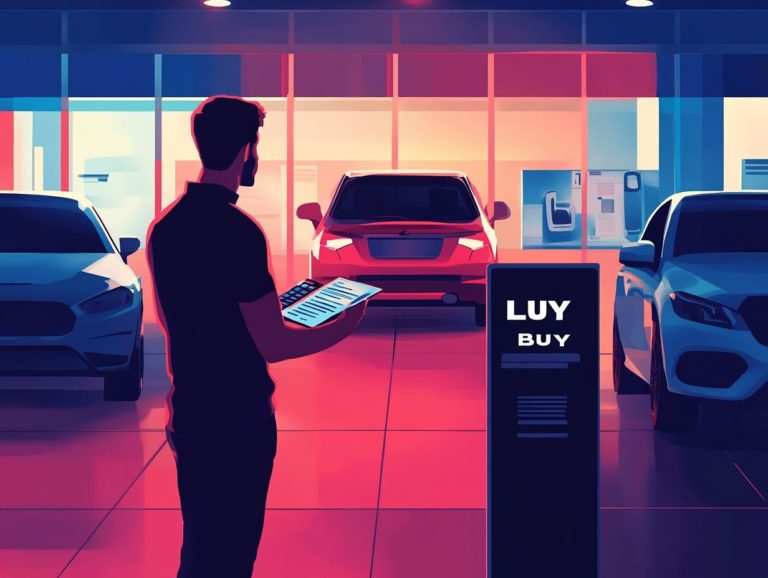How to Prepare for a Car Purchase Negotiation
Navigating the car negotiation process may seem overwhelming, but grasping the steps involved can empower you to secure the best deal possible.
From researching the car s value and current market prices to establishing a realistic budget, preparation is paramount. This guide will walk you through each stage of the negotiation, from gathering essential documents to confidently managing counteroffers.
By the end, you’ll possess the knowledge and strategies necessary to drive away completely satisfied with your purchase.
Contents
- Key Takeaways:
- Understanding the Car Negotiation Process
- Researching the Car and Market
- Setting a Budget and Priorities
- Preparing for the Negotiation
- During the Negotiation
- Finalizing the Deal
- Frequently Asked Questions
- What does it mean to “prepare” for a car purchase negotiation?
- Why is it important to prepare for a car purchase negotiation?
- What information should I research before a car purchase negotiation?
- How can I gather this information?
- What documents should I bring to a car purchase negotiation?
- What are some tips for negotiating a car purchase?
Key Takeaways:

- Understand the car negotiation process and what to expect before entering negotiations.
- Conduct thorough research on the car’s value and market prices to have a clear understanding of what you should be paying.
- Set a budget and identify non-negotiables to have a clear idea of your maximum offer and priorities during negotiations.
Understanding the Car Negotiation Process
Grasping the intricacies of the car negotiation process is essential for both first-time buyers and experienced shoppers. Get ready for a journey through several exciting stages, from researching the current market value of your desired vehicle to skillfully navigating the often convoluted landscape of dealer fees and financing options.
As a buyer, you should be equipped with effective negotiation strategies while aiming to secure the most advantageous price and remaining aware of your consumer protection rights.
Mastering the art of negotiation not only elevates your buying experience but also gives you the power to make well-informed decisions about trade-in values and out-the-door pricing when dealing with car dealers.
What to Expect During Negotiations
During negotiations, it’s vital for you to grasp what to expect from the car dealer and the salesperson, which can help you implement tips for negotiating used car prices and set the stage for a smoother buying experience.
As a buyer, you often find yourself navigating a complex landscape where effective communication is key. The salesperson is skilled at showcasing the vehicle’s best features while guiding you toward a suitable price point.
As negotiations unfold, understanding counteroffers becomes essential; a well-thought-out response can significantly sway the outcome in your favor.
Being informed about financing terms can spare you from unexpected costs later on. For example, having knowledge about interest rates, payment plans, and possible discounts gives you the power to make informed decisions.
Finding the right balance between asserting your needs and maintaining flexibility can lead to a more satisfying purchase experience.
Researching the Car and Market
Researching the car and the market is a crucial step in securing a successful negotiation outcome. This preparation arms you with vital insights into the vehicle’s pricing and overall value, giving you the power to make informed decisions.
Knowing the Car’s Value and Market Prices
Understanding the value of a car and its market prices gives you the power to make informed decisions during negotiations, ensuring you don’t end up overpaying.
By exploring trustworthy pricing sources like Kelley Blue Book, Edmunds, and NADA Guides, you can uncover valuable insights into both how much cars are sold for and how much cars are bought for.
Grasping the wholesale value is especially crucial, as it establishes a baseline for your negotiations, allowing you to determine whether a listed price is reasonable or inflated. This knowledge gives you the leverage needed to engage in discussions with confidence.
Being aware of fair market conditions including local demand and seasonal fluctuations can further refine your negotiation strategies, ultimately leading to more favorable purchasing outcomes.
Setting a Budget and Priorities
Establishing a budget and setting clear priorities is essential when negotiating a car price. This approach not only clarifies your financial commitment but also streamlines the buying process, making it more efficient and effective.
Determining Your Maximum Offer

Setting your maximum offer is crucial for negotiation. This keeps you within budget while aiming for a competitive car price.
Start by evaluating your financial limits and the fair market value of the vehicle. Research similar cars in your area to gather insights on average pricing.
This information helps you establish a reasonable offer that aligns with your budget.
Using effective negotiation tactics boosts your chances of landing the best deal. Present your offer with factual data; this enhances your position and sets a professional tone for productive discussions.
Identifying Non-Negotiables
Identifying your non-negotiables before negotiations can shape the outcome and help you avoid unnecessary compromises.
For example, know the trade-in value of your vehicle and any dealer fees that matter to your budget. Express these priorities clearly and confidently.
Effective communication about your non-negotiables shows how much flexibility you have. It also fosters a transparent dialogue with the dealer.
By focusing on critical points, you can avoid distractions from less important issues, ensuring you secure the best deal without losing sight of your goals.
Preparing for the Negotiation
Get ready to negotiate like a pro this is your chance to secure the best price! Preparing involves gathering necessary documents and understanding your financing options.
By doing this, you empower yourself to navigate the process confidently and effectively.
Gathering Necessary Documents
Gathering the right documents is essential in your car-buying journey. It ensures you’re well-prepared for negotiations.
Having the right paperwork showcases your credibility and seriousness, which can significantly influence the terms of the deal.
Key documents include proof of income and financing details, as these highlight your financial stability.
Presenting proof of income boosts your bargaining power and reassures dealers of your ability to pay. Having financing details streamlines the process and shows you’ve been vetted by lenders.
By bringing these documents, you pave the way for a smoother and more successful buying experience, fostering trust and transparency with the dealer.
Practicing Negotiation Techniques
Practicing negotiation techniques can enhance your confidence and effectiveness when engaging with car dealers.
Before the dealership visit, familiarize yourself with various negotiation styles. For example, use the ‘anchoring’ technique by setting a specific price point early in the conversation.
Engage in role-play for different scenarios to refine your responses to common sales tactics, like upselling or pressure closing.
Gathering relevant market data helps you counteroffer effectively. By compiling average prices and exploring alternatives, you navigate discussions confidently.
This promotes a more balanced dialogue for better terms and conditions.
During the Negotiation
During the negotiation phase, adhere closely to your budget while remaining prepared for counteroffers and pressure tactics from the dealer.
Sticking to Your Budget and Priorities

Sticking to your budget and priorities is crucial during negotiations to prevent overspending on your car purchase.
Establishing firm price limits safeguards your finances and ensures you stay within your acceptable range. It s important to identify and prioritize essential features, as this allows you to differentiate between what you want and what you truly need.
Focusing on the aspects that genuinely matter in a vehicle helps streamline the negotiation process. This prevents you from getting sidetracked by tempting but unnecessary add-ons.
Approaching negotiations with a clear understanding of these parameters gives the power to you and fosters a more confident dialogue. This significantly enhances your chances of securing a favorable agreement.
Handling Counteroffers and Pressure Tactics
Handling counteroffers and pressure tactics requires a strategic mindset to ensure you remain in control of the negotiation process.
Understanding the dealer’s motivations is essential, as they typically aim to maximize their profit, which can lead to aggressive sales tactics. Stay calm and focused on your financial limits during discussions.
Prepare a clear budget and outline your priorities before diving into negotiations. Always be ready to walk away if the deal doesn t feel right.
Recognizing pressure tactics, such as limited-time offers or claims of scarcity, allows you to maintain your composure. This leads to informed decisions that align with your goals.
Take a moment to assess whether the counteroffer genuinely meets your needs before responding.
Finalizing the Deal
Finalizing the deal requires a careful review of the contract. Ensure that every agreed-upon term is accurately reflected before you put pen to paper.
Reviewing and Signing the Contract
Reviewing and signing the contract is a crucial final step in your car-buying journey. This step provides essential protection against unexpected fees.
At this stage, scrutinize every detail, including documentation fees that could inflate the overall cost. Also check financing terms that may come with interest rates or hidden charges.
Carefully assess the total amount financed and any penalties for early repayment. Diligence in this review safeguards you from potential pitfalls and ensures a full understanding of the purchase agreement.
This careful attention protects your investment and gives you confidence in your purchase!
Ensuring All Agreed-Upon Terms are Included
Ensuring that all agreed-upon terms are included in the contract is crucial for safeguarding your interests during a car purchase.
Conduct a thorough review of each section of the contract before you sign. Pay close attention to the pricing details, confirming that the final amount matches what was discussed.
Ensure that any dealer fees are clearly outlined and justified. It s important to verify that any incentives, trade-in values, and warranties are accurately represented.
Cross-checking these elements helps you avoid potential misunderstandings and disputes post-sale, contributing to a smoother transaction and greater peace of mind.
Frequently Asked Questions
What does it mean to “prepare” for a car purchase negotiation?

Preparing for a car purchase negotiation means doing your research and gathering necessary information and documents beforehand. To ensure you’re well-equipped, check out this guide on how to prepare for a new car purchase. This enables you to confidently negotiate a fair deal.
Why is it important to prepare for a car purchase negotiation?
Preparation is important because it can save you money and time. It gives you a better understanding of the market, the car you want to purchase, and your own budget and needs.
Ready to make your car-buying experience smoother? Start your research and check out these negotiating tips for buying a new car to prepare for negotiations today!
What information should I research before a car purchase negotiation?
Discover the average market price for the car. Also, check its features, available ways to pay for the car, and any discounts or promotions.
How can I gather this information?
Use online resources like car comparison websites and customer reviews. Talk to friends, family, and car experts for their insights.
What documents should I bring to a car purchase negotiation?
Bring your driver’s license, insurance info, and proof of income. Having a list of desired features will also help during negotiations.
What are some tips for negotiating a car purchase?
Know your budget and stick to it. Be confident, assertive, and ready to walk away if the deal isn t favorable.






